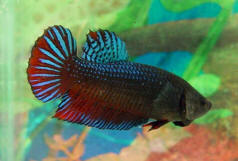BIO315 Laboratory Guide #6
AGONISTIC BEHAVIOR IN CRAYFISH
AND PARASITOID WASPS

This lab is under development
I. OBSERVING MALE BETTA DISPLAY BEHAVIOR
As with any behavioral study you should begin by simply observing your subject animals and familiarizing yourself with the behaviors of interest.
1) Prior to your investigation, maintain several males in individual containers, visually isolated from each other. One-quart mason jars have been provided for this purpose. Make sure that the visual barriers used for isolation are light colored, so that individual fish are not inadvertently exposed to mirrored images of themselves.
2) Transfer a single male to a 2˝ gallon aquarium, making sure that the water is dechlorinated and matched in temperature (see care notes below).
3) Position a mirror against the side of the aquarium. Identify any display elements you observe.
4) Remove the mirror for at least five minutes. Try placing one of the simple models in the aquarium and see if you can elicit display behavior. Note: be patient, don’t try to elicit the behavior by chasing the fish around and/or bludgeoning it with the model.
5) Again, allow your fish a five minute “rest”. Now, place a glass partition in the aquarium, isolating your subject fish in one end. Transfer a second fish into the empty compartment. Again observe any display elements that occur. Can you identify a “winner” and “loser”, or do both fish continue to display? Think about what aspects of the display or target response are "unnatural" in both the mirror and the separated fish situations.
6) Finally, remove the glass partition. Does the display escalate? Be prepared with a net to separate the fish if the display escalates to biting.
7) Return your fish to their isolated containers.
II. DO SOME READING
Several articles have been provided for you to look through. Two of these deal with behavioral sampling methods. What sampling methods would be most appropriate for the display behavior which you have observed? What are the alternative ways of quantifying behavioral “acts”? What are the alternative ways of quantifying behavioral “states”? The remainder of the articles deal with specific studies of Betta display and reproductive behavior. These articles may give you some ideas for simple experiments which you might conduct.
III . CARE OF BETTA FISH
Container preparation. Use only glass or durable plastic containers. Clean each container before use. To clean the container:
1) Empty, wipe out, and if necessary scour out the container. If you need to use soap or detergent, be sure to completely rinse out the container at least three times with tap water.
2) Pour is a small amount of free-running (non-iodinized) salt, add a bit of water, and scour out the container with a clean, detergent-free scrubbie. This will serve to kill most bacteria that are potentially harmful to fish. Again, rinse out the container at least three time with tap water.
3) Fill the container with dechlorinated water. Appropriately dechlorinated water can be easily made by adding a good squirt of StressCoat to a bucket of tap water, then stirring it briefly to mix. StressCoat will bubble or foam up a bit as it is strirred. This is normal, so don't panic. Don’t worry about using too much StressCoat.
Water. Fish are very sensitive to chlorine and temperature changes.
1) Always dechlorinate tap water with StressCoat or another commercial dechlorinating agent.
2) Do not move fish back and forth between different temperature containers. The easiest way to avoid this is to keep all of your containers at room temperature. The easiest way to do this is to plan ahead and let all of your filled containers sit for at least 12 hours to equilibrate to room temperature.
3) Once a week, replace 1/3 of the water in each fish’s container with fresh, dechlorinated tap water. If your fish is in cloudy water, you may change out up to 2/3 of the water.
Transferring fish. Fish may be transferred either by net or by carefully dumping one container into another.
Feeding. The old admonition not to overfeed your fish is accurate – the surest way to kill fish is to foul their water with uneaten food. Feed your fish no more often than once a day, and add only as much food as the fish will immediately eat. Fish can safely go without food for at least a week. If uneaten food accumulates in the container for more than 24 hours, try to siphon out the food and/or change out the water.
Bubble nests. If you notice a clump or mat of bubbles at the top of your fish container, don't panic. This is NOT a sign of detergent in the water. Healthy male Betta fish regularly produce these bubble nests in preparation for receiving and guarding fertilized eggs from a female. A bubble nest is a sign that your male is healthy and sexually prepared, if perhaps a bit frustrated.
IV . YOUR EXPERIMENT
Your task in this two-week laboratory is to ask a simple question, develop a simple hypothesis, design a simple experimental test of your hypothesis, conduct the experiment, gather quantitative data, and apply this data to evaluating your hypothesis. The following guidelines should help you in this process:
1) Keep your question and design simple.
2) Determine exactly what you need in the way of fish, continers, supplies, etc. Discuss this with the instructor AS EARLY AS POSSIBLE, os that the supplies will be ready when you nee them. Allow TWO FULL WORKING DAYS for the instructor to get you additional fish.
3) Think about experimental controls. Bettas aren’t picky about “natural” conditions, so you should not be either.
4) Try to design a study and conduct observations which result in numbers. In other words, try to quantify the behavior which you observe. Frequencies of discrete behavioral acts and durations on persistent behavior states are standard kinds on numbers to record. During the next two weeks we will be discussing in detail behavioral sampling and quantification methods.
5) Standard experimental methods involve physically separated males, mirror displays, and the use of target models. Possible general topics (from which you should derive and test a very specific experimental question) include habituation, sensitization, effects of isolation, supernormal stimuli, choice between multiple targets, and “dominance” hierarchies.
6) Female Bettas may also be obtained, although they are not as readily available as are males. Let the instructor know well in advance if you need to order females.
7) Try to design several potential experiments. As you think through your designs, consult with the instructor to determine which designs are the most feasible and what materials you will need to conduct you final experiment.
8) Useful experimental questions usually stem from direct observations and take the forms of "why does this happen?", "what stimulus features are important for this observed behavior?", or "does this behavior correspond to this particular theoretical model?". Providing a testable answer and applying a carefully conducted test to such a question will generally produce a good study, no matter what the outcome.
9) Try to avoid experimental questions which could be stated in the form of "I wonder what the fish would do if I did this?" or "wouldn't it be nice if I could show that the fish does this when I do thus and so?". Such questions tend not to produce meaningful results, no matter what the outcome.
If you chose to write up this experiment, the deadline is Friday of week 5 of the course. You may be able to conduct your experiment entirely during lab period next week. However, it is more likely that you will have to make some or all of your observations on your own time.
